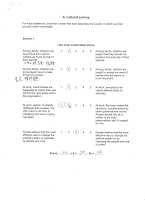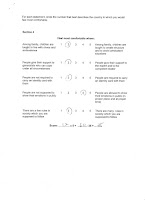我的測驗結果顯示我在前三項跟台灣人的平均值差很多,反倒跟荷蘭人平均值比較接近,所以在荷蘭工作跟生活應該問題不大。其中權力距離指數甚至比荷蘭人還低,大概到瑞典人的程度,顯示我在這裡要小心不要挑戰老闆過頭。
荷蘭的指數(沒括號的是荷蘭人的指數,括號內的是我的):(點擊可放大)
 台灣的指數(左上角):(點擊可放大)
台灣的指數(左上角):(點擊可放大) 測驗簡介及五大指數解說
測驗簡介及五大指數解說http://www.geert-hofstede.com/
Power Distance Index (PDI) that is the extent to which the less powerful members of organizations and institutions (like the family) accept and expect that power is distributed unequally. This represents inequality (more versus less), but defined from below, not from above. It suggests that a society's level of inequality is endorsed by the followers as much as by the leaders. Power and inequality, of course, are extremely fundamental facts of any society and anybody with some international experience will be aware that 'all societies are unequal, but some are more unequal than others'.
Individualism (IDV) on the one side versus its opposite, collectivism, that is the degree to which individuals are inte-grated into groups. On the individualist side we find societies in which the ties between individuals are loose: everyone is expected to look after him/herself and his/her immediate family. On the collectivist side, we find societies in which people from birth onwards are integrated into strong, cohesive in-groups, often extended families (with uncles, aunts and grandparents) which continue protecting them in exchange for unquestioning loyalty. The word 'collectivism' in this sense has no political meaning: it refers to the group, not to the state. Again, the issue addressed by this dimension is an extremely fundamental one, regarding all societies in the world.
Masculinity (MAS) versus its opposite, femininity, refers to the distribution of roles between the genders which is another fundamental issue for any society to which a range of solutions are found. The IBM studies revealed that (a) women's values differ less among societies than men's values; (b) men's values from one country to another contain a dimension from very assertive and competitive and maximally different from women's values on the one side, to modest and caring and similar to women's values on the other. The assertive pole has been called 'masculine' and the modest, caring pole 'feminine'. The women in feminine countries have the same modest, caring values as the men; in the masculine countries they are somewhat assertive and competitive, but not as much as the men, so that these countries show a gap between men's values and women's values.
Uncertainty Avoidance Index (UAI) deals with a society's tolerance for uncertainty and ambiguity; it ultimately refers to man's search for Truth. It indicates to what extent a culture programs its members to feel either uncomfortable or comfortable in unstructured situations. Unstructured situations are novel, unknown, surprising, different from usual. Uncertainty avoiding cultures try to minimize the possibility of such situations by strict laws and rules, safety and security measures, and on the philosophical and religious level by a belief in absolute Truth; 'there can only be one Truth and we have it'. People in uncertainty avoiding countries are also more emotional, and motivated by inner nervous energy. The opposite type, uncertainty accepting cultures, are more tolerant of opinions different from what they are used to; they try to have as few rules as possible, and on the philosophical and religious level they are relativist and allow many currents to flow side by side. People within these cultures are more phlegmatic and contemplative, and not expected by their environment to express emotions.
Long-Term Orientation (LTO) versus short-term orientation: this fifth dimension was found in a study among students in 23 countries around the world, using a questionnaire designed by Chinese scholars It can be said to deal with Virtue regardless of Truth. Values associated with Long Term Orientation are thrift and perseverance; values associated with Short Term Orientation are respect for tradition, fulfilling social obligations, and protecting one's 'face'. Both the positively and the negatively rated values of this dimension are found in the teachings of Confucius, the most influential Chinese philosopher who lived around 500 B.C.; however, the dimension also applies to countries without a Confucian heritage.
作答範例及試題內容(有版權,不要拿去賣~~~):(點擊可放大)





 各國指數結果以及本國與他國指數比較
各國指數結果以及本國與他國指數比較http://www.geert-hofstede.com/hofstede_dimensions.php
No comments:
Post a Comment